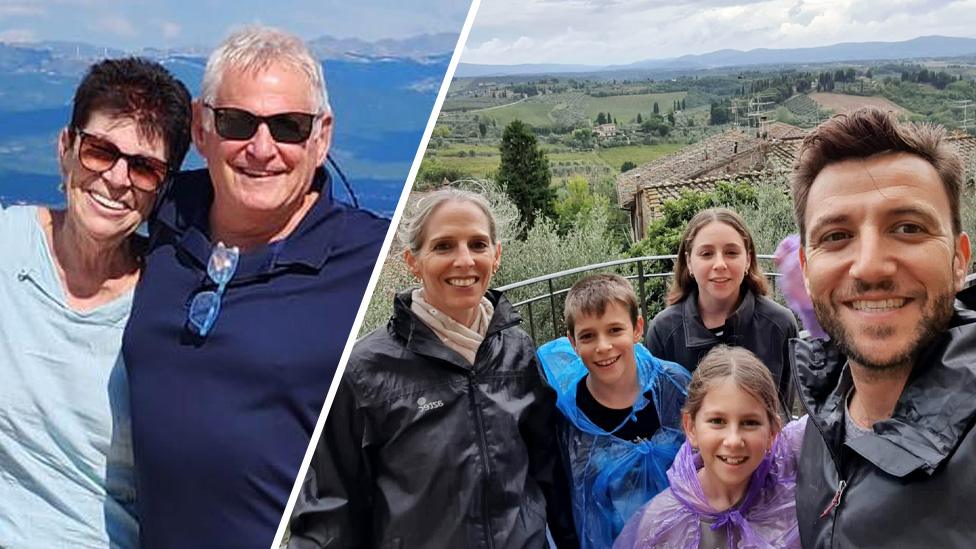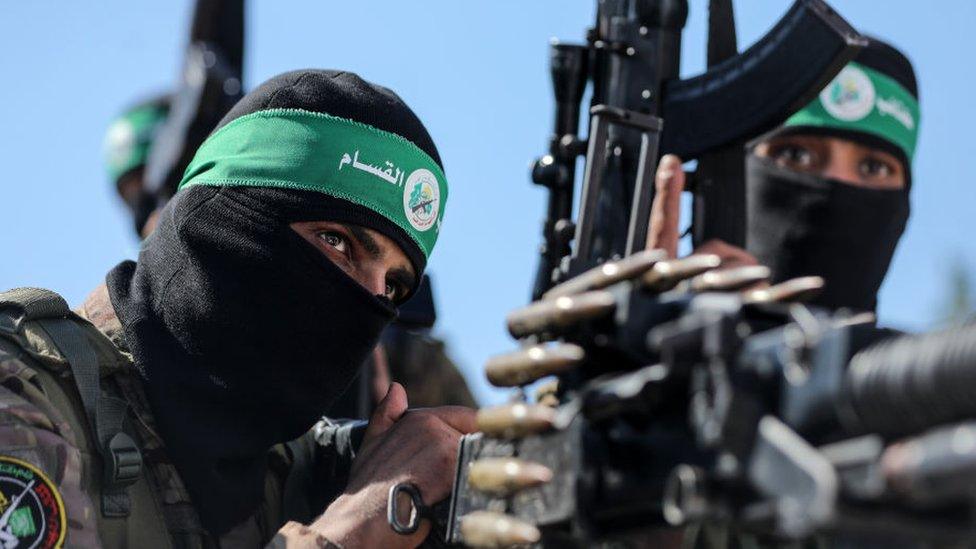Israel and Gaza on campus: Tumult at US colleges as two sides dig in
- Published
Watch: Rallies for Palestine, Israel create tense scene at Columbia University
A debate over the war between Israel and Hamas is raging on US college campuses. In a social media age that demands people pick a side on divisive issues, is there still space for young Americans to talk to each other?
Hundreds of students gathered on the main quad at Columbia University in New York City last week to engage in duelling protests in support of Israel and the Palestinian people - and to condemn the loss of life.
Pro-Israel protesters, most of whom were Jewish, draped themselves in white and blue Israeli flags. For much of the event, they remained silent, letting signs with photos of the victims of Hamas' deadly attack speak for them.
Across the square, students who supported the Palestinians waved signs declaring "Free Palestine" and "End the Occupation". A female student from Gaza spoke of her mother, trapped by an Israeli blockade.
Though the two sides stood just yards apart, the ideological distance between them seemed insurmountably wide, and only grew more pronounced as the evening progressed.
One of the leaders of the pro-Palestinian demonstration read aloud an open letter published by two student groups at Columbia just a day after Hamas militants rampaged through a music festival and several Israeli towns, killing at least 1,400 people and taking about 150 hostages.
The attack was a "historic moment for the Palestinians of Gaza, who tore through the wall that has been suffocating them in one of the most densely populated areas on Earth".
"Despite the odds against them," the speaker continued to read, "Palestinians launched a counter-offensive against their settler-colonial oppressor."
To these students, the attack on Israel was an important development in the decades-long fight for Palestinian autonomy. And Israel's response in the days since was another example of its indifference to the suffering of the Palestinian people.
More than 2,700 Palestinians in Gaza have died during retaliatory Israeli air strikes, while just over two million people there are trapped by a blockade and cut off from power and clean water.
Israeli officials have used extreme language, with Defence Minister Yoan Gallant referring to Hamas militants as "human animals". And the death toll will rise if Israel launches an expected ground offensive.
Most of the activists at Thursday's rally would not speak to reporters. But Darializa Avila Chevilier, who graduated from Columbia in 2016 and had come to support the pro-Palestinian protesters, told the BBC: "No-one wants violence. What we are saying is the violence will end when there's justice, and people are living with dignity."
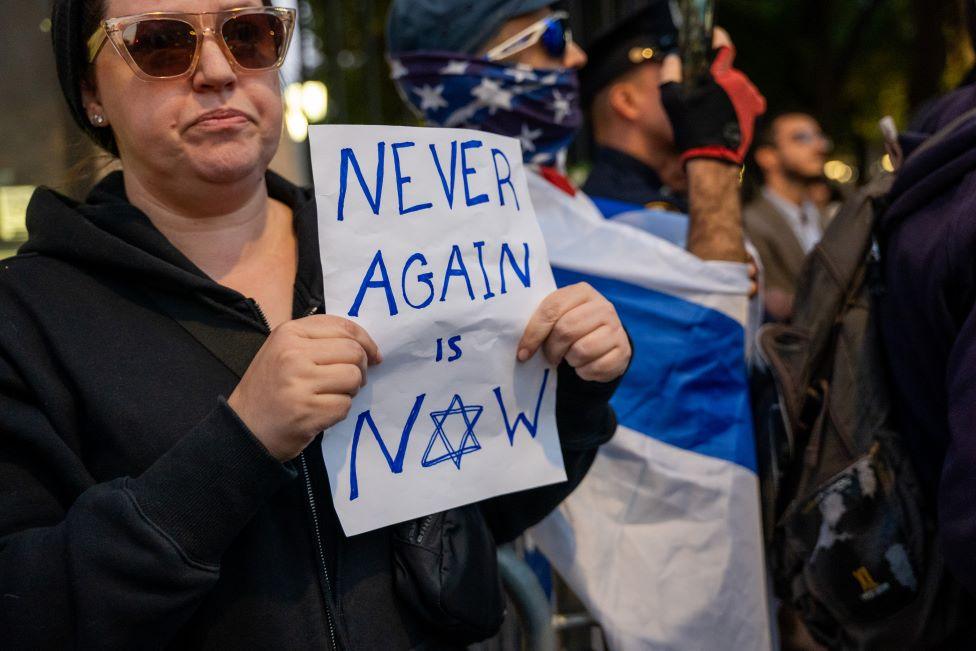
Woman at a rally at Columbia University, New York, supporting Israel
The speakers at the rally condemned the loss of all civilian life and held a moment of silence. But they did not make specific mention of the Israeli victims of violence, or the atrocities carried out by Hamas fighters against civilians, including many women and children.
The protest's organisers, Students for Justice in Palestine, told the BBC in a statement that they oppose any form of violence against innocent civilians and stand "only for the preservation of life and justice".
They went on to question "why an entire nationality—Palestinians—are being made to answer for the actions of [Hamas]".
Yet many of their Jewish classmates across the lawn heard something else in those speeches: a dismissal of murders perpetrated against their own religious and ethnic minority, which has also faced persecution.
"If you are justifying the murder of innocent civilians, you do not understand human rights," one of their posters declared.
Columbia University is not alone in reeling from this political divide.
Student groups at Harvard University issued a statement which blamed Israel's policies for the massacre of its civilians, which prompted a backlash from powerful alumni.

More on Israel Gaza war
Follow live: Latest updates
History behind the story: The Israel-Palestinian conflict
Gaza maps: What life is like in the Gaza Strip
Hamas' attack on Israel: The volunteers giving dignity to the dead

On other campuses across the country, students and schools have received an avalanche of criticism, accused by both sides of either justifying extremism or staying silent in the face of it.
These arguments have played out over decades, but the unprecedented scale of the Hamas attack and Israel's military response means tensions and emotions are spiking.
The current war is the culmination of a shift over the past two decades which has seen hardliners in power in Israel and Gaza, and the prospect for peace via a two-state solution diminish.
"There is a growing gulf, but I think that gulf represents what's going on in Israel and Palestine," said Zachary Lockman, a professor at New York University who teaches a course on the history and politics of the conflict and has witnessed many campus debates over the years.
Among students, he said, this translates into "deepening polarisation, and very little common ground". And at colleges and on social media, the debate is often framed as 'They're either with us or against us', he explained.
Prof Lockman points out a few trends from the past decade or so that help explain the growing chasm on campus.
First, the Palestinian cause has become more of a priority for left-wing groups in the US. Many activists see a link between the renewed focus in America on social justice and structural racism with Israel's blockade of Gaza and presence in the West Bank.
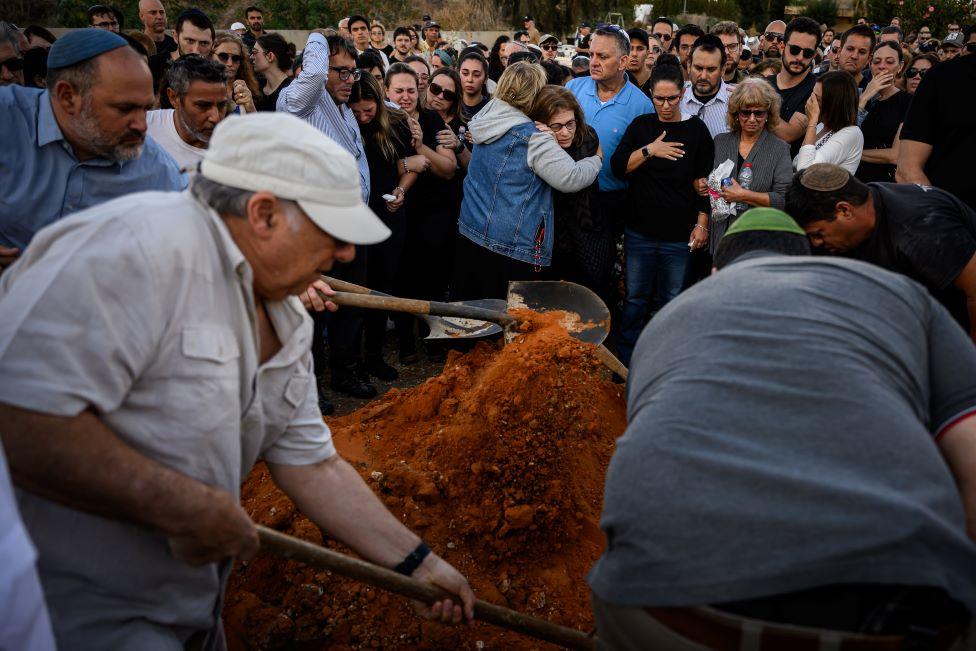
Dr Daniel Levi Ludmir , killed in the Hamas attacks, is buried near Tel Aviv
In the US, critics of the Israeli government are more likely to see the state of Israel - and especially the expansion of Israeli settlements which most of the international community deems illegal - through the lens of colonialism.
Simultaneously, Americans' attitudes towards Israel have shifted along generational lines. Younger people are far more likely to have an unfavourable view of Israel than a favourable one, a July 2022 Pew Research Center poll found.
And a partisan divide has opened up as well. For the first time, Democrats are now more likely likely to feel more sympathy for the Palestinian people, according to Gallup polling, while Republicans are more likely to sympathise with Israel.
Students who back the Palestinian cause argue that while support for their stance may have grown, they believe that pro-Israel sentiment remains strong among America's political, media and academic establishment.
At Thursday's protest, Students for Justice in Palestine condemned Columbia University leadership for not taking a firmer stand in support of the Palestinian people. "I lied to [my mother]," a young woman from Gaza told the crowd, "telling her I was safe at university."
Back across the quad, the young Jews who attended the rally in support of Israel said they often found themselves frustrated and alienated by the tone of campus debates.
"Even in this liberal university, people cannot respect one another," said Lihi Tal, 24, who is studying at Columbia after completing her military service in Israel. "We're feeling lonely here in the university. There are some people who supports us, but I'm afraid to say that I'm a Jew."
Other students held strongly partisan stances on the conflict. One Israeli student, Daniel Katz, wandered over to listen to the opposing protest, but found himself unpersuaded. He solely blamed Palestinians for the situation in Gaza before this latest conflict erupted, which human rights groups have called inhumane due to Israel's 16-year blockade.
"They chose [Hamas] to lead, and they betray their own people," he said, referring to the 2006 election that brought the militant group to power and is the last election held there.
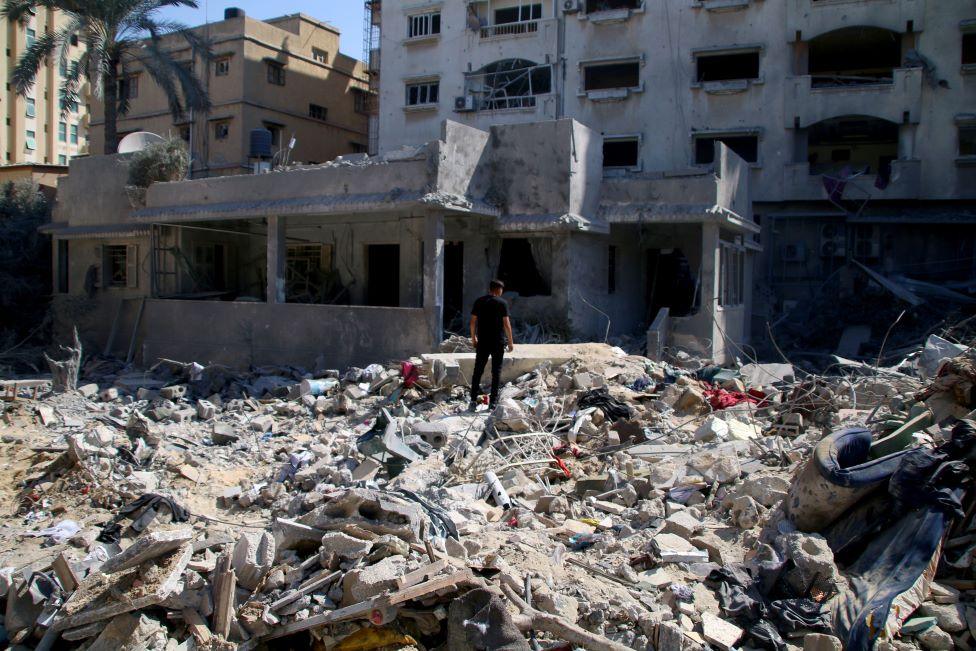
Homes in Gaza reduced to rubble
The signs held by pro-Israel students on Thursday featured many victims of Hamas' attack, but did not display the casualties in Gaza that have mounted as Israel retaliates.
Like their classmates across the lawn, these students also condemned suffering of civilians on both sides, but remained focused on the Israeli and international victims of the terror attack.
A few felt that more nuanced views of the war were being drowned out, and worried that the rhetorical battle lines being drawn would not help students gain a better understanding of the conflict - or each other.
"I think it's very unfortunate, it really saddens me that we're on opposite sides," said Stephanie, a 20-year-old Jewish student from Brooklyn who asked the BBC not to reveal her last name."There's not there's not enough dialogue between these two [groups]. Everything's separate."
Stephanie had joined the pro-Israel side, but worried that pro-Palestinian classmates were ignoring or misunderstanding the range of Jewish opinion on Israel and its current right government.
"People don't recognise that this group…support Jews and support Israel as a safe haven for them," Stephanie said. "But also, there's diversity of opinion, and that people also support Palestinian life and Palestinian safety."
Before Thursday's protests, a classmate had approached Stephanie to discuss organising an event where students from opposing sides could talk through the conflict.
"I do believe there is a chance for that to happen, for people to come together in that way," Stephanie said. "I think right now, it's difficult."
- Published13 October 2023
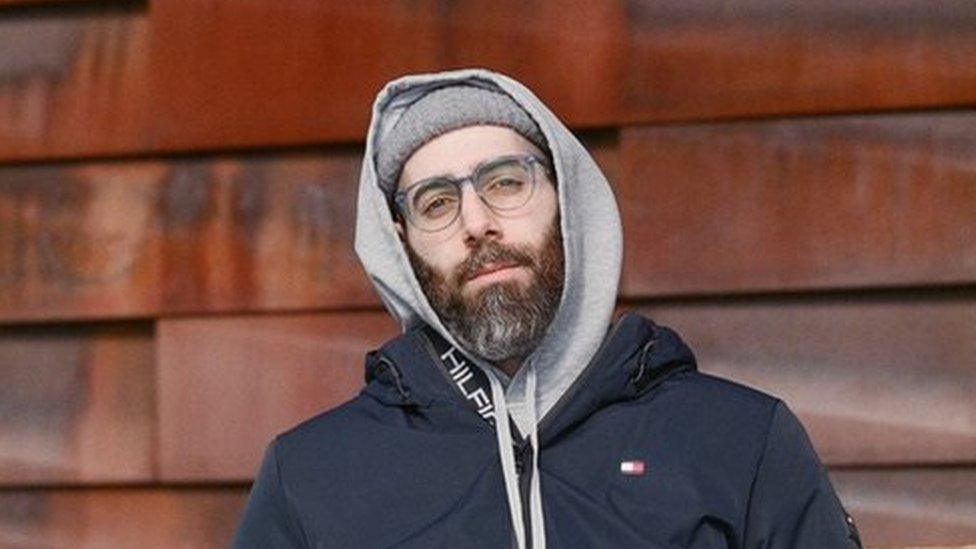
- Published13 October 2023
